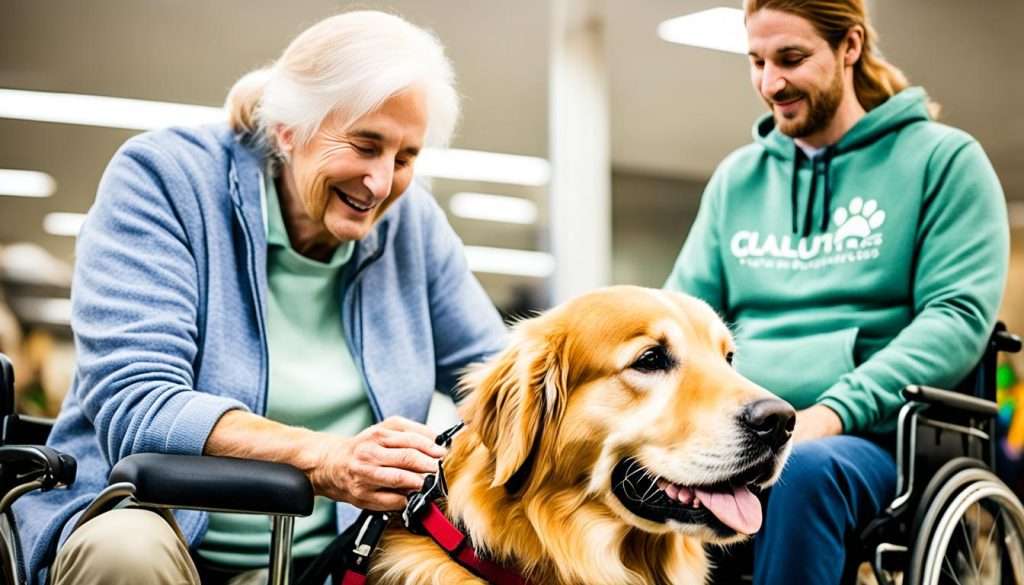In today’s fast-paced world, where stress and burdens can often take a toll on our mental and emotional well-being, therapy dogs have emerged as a beacon of comfort and support. These specially trained pets have the incredible ability to uplift spirits, provide solace, and bring joy to individuals in various settings, such as hospitals, retirement homes, and schools. As you embark on your journey to learn more about therapy dogs and their remarkable impact, let us explore the best therapy dog breeds that are renowned for their intelligence, temperament, and affinity for connecting with people.
When it comes to therapy dogs, it is crucial to consider factors such as temperament, training, certification, and organizations dedicated to this noble cause. Whether you are interested in therapy dog programs, exploring therapy dog breeds, or understanding the requirements and benefits of therapy dog certification, this article will equip you with the knowledge you need.
Throughout this series, we will delve into each therapy dog breed’s unique qualities and suitability for different therapy settings, ranging from hospitals and care homes to schools and beyond. So, join us on this journey to discover the perfect therapy dog breed for your needs, as we delve into the world of these incredible companions and the vital roles they play in improving well-being.
Golden Retriever
The Golden Retriever is an exceptionally popular and intelligent breed renowned for their abilities as therapy dogs. Their gentle nature and quick learning capabilities make them a perfect fit for providing comfort and support in various therapy settings. These dogs are often found working in hospitals and retirement homes, where their size and strength make them ideal for physical assistance.
When it comes to therapy dog training, Golden Retrievers excel due to their eagerness to please and their natural aptitude for learning. With the right guidance and education, they can develop the necessary skills to become excellent therapy dogs. Their warm and affectionate temperament helps create a sense of comfort and emotional support for individuals in need.
To become a certified therapy dog, Golden Retrievers need to meet certain requirements set by therapy dog organizations. These may include completing specific training programs, passing temperament evaluations, and demonstrating good behavior in different environments. Therapy dog certification ensures that they are prepared to handle the responsibilities and challenges that come with providing therapy support.
If you’re considering a Golden Retriever as a therapy dog, it’s important to provide them with adequate socialization and ongoing training. This will help ensure their ability to engage positively with a variety of individuals and situations. Additionally, regular exercise and mental stimulation are essential to keep them happy and healthy while fulfilling their therapy dog duties.
Golden Retrievers possess an innate ability to bring joy and comfort to those in need. Their unwavering loyalty and intuitive nature make them a beloved choice for therapy work.
“The loyalty and intuition of Golden Retrievers make them an ideal choice for therapy work.”

| Golden Retriever at a Glance | |
|---|---|
| Size | Large |
| Temperament | Gentle, Intelligent, Friendly |
| Strengths | Physical support, Emotional comfort |
| Requirements | Therapy dog training and certification |
| Best Suited For | Hospitals, Retirement homes |
German Shepherd
The German Shepherd is a stunning and versatile breed that excels in various roles, including working alongside police departments. However, they are also well-suited for providing emotional comfort as therapy dogs. Known for their intelligence and keen awareness, German Shepherds can quickly pick up on subtle changes and provide unparalleled support.
German Shepherds have a natural ability to connect with individuals and empathize with their needs. Their instinctive nature makes them excellent listeners and companions in therapy settings, where they can offer a comforting presence and bring solace to those in need.
As therapy dog candidates, German Shepherds undergo thorough training to enhance their already remarkable temperament. They learn to guide individuals and provide emotional support in a calm and patient manner.
Benefits of German Shepherds as Therapy Dogs
German Shepherds offer a range of benefits as therapy dogs:
- Intelligence: Their exceptional intelligence allows them to understand complex commands and adapt to different therapeutic situations.
- Alertness: German Shepherds have a keen sense of awareness, enabling them to detect subtle changes in human behavior and provide comfort accordingly.
- Physical Support: With their strength and size, German Shepherds can provide physical support to individuals who need assistance with mobility.
- Emotional Bond: They form deep emotional bonds with their handlers, making them reliable companions in therapy environments.
German Shepherds undergo therapy dog training and certification to meet specific requirements set by therapy dog organizations. The certification process ensures they possess the necessary temperament and behavioral traits to excel in their role as therapy dogs.
Therapy dog organizations such as Therapy Dogs International, Pet Partners, and Alliance of Therapy Dogs acknowledge the valuable contribution of German Shepherds and welcome them into their programs.
If you are considering a therapy dog, the German Shepherd is undoubtedly one of the best breeds to consider. Their unique combination of intelligence, agility, and empathetic nature makes them exceptional companions for individuals in therapy settings.

French Bulldog
The French Bulldog is a popular breed known for its easy-going personality and adaptability. These small yet sturdy dogs make excellent therapy dogs with their innate ability to sense changes in human behavior. With the right training, French Bulldogs can excel in therapy settings and provide support and comfort to those in need.
One of the key advantages of French Bulldogs as therapy dogs is their playful and gentle temperament. Their affectionate nature and love for human companionship make them a joy to be around, creating a positive and comforting environment in therapy settings.
Another benefit of French Bulldogs is their non-shedding coat. This makes them ideal for individuals who may have allergies or sensitivities to dog hair. The low-maintenance grooming requirements of French Bulldogs also make them a practical choice for therapy work.
“French Bulldogs have an incredible ability to connect with people on an emotional level. Their presence alone can bring a sense of calm and happiness to those they interact with.”
French Bulldogs can be trained to perform various tasks that benefit therapy settings, such as providing physical comfort or assisting in therapeutic exercises. Their intelligence and eagerness to please make them quick learners, making therapy dog training and certification a smooth process.
When considering a French Bulldog for therapy work, it’s important to ensure they meet the requirements set by therapy dog organizations. These requirements may include passing temperament assessments, obedience training, and health evaluations to ensure the safety and well-being of both the dog and the individuals they interact with.
Overall, French Bulldogs are an excellent choice as therapy dogs. Their easy-going nature, ability to sense changes in human behavior, and non-shedding coat make them well-suited for therapy work. With the right training and certification, French Bulldogs can provide valuable support and comfort to individuals in therapy settings.

Bichon Frise
The Bichon Frise is a charming and popular therapy dog breed. Once properly trained, these little dogs can thrive in various settings such as care homes, hospitals, and schools. Their playful and gentle temperament makes them a joy to be around, and their non-shedding coat is a great advantage in therapy settings.
With their small size and adorable appearance, Bichon Frises have an innate ability to bring comfort and happiness to those they interact with. Their friendly nature and willingness to please make them well-suited for therapy work.
One of the unique characteristics of the Bichon Frise is their hypoallergenic coat. This means that they produce fewer allergens, making them a suitable choice for individuals with allergies or sensitivities. This quality allows Bichon Frises to provide comfort without triggering allergies in therapy settings.
Therapy Dog Training and Certification
To become a therapy dog, a Bichon Frise must undergo therapy dog training. This training focuses on socialization, obedience, and desensitization to various environments and situations. It also includes specific therapy dog tasks and behaviors, such as staying calm in stressful situations and responding to cues from handlers.
After completing the necessary training, Bichon Frises can be certified as therapy dogs through recognized therapy dog organizations. These organizations have specific requirements and evaluations to ensure that therapy dogs are well-prepared to provide support and comfort in therapy settings.
Some therapy dog organizations that certify Bichon Frises include:
- Therapy Dogs International
- Alliance of Therapy Dogs
- Pet Partners
These organizations provide the necessary resources, guidance, and support for therapy dog teams.
Therapy dog certification requires regular renewal to ensure that the dog and handler continue to meet the standards set by the organizations. This helps maintain the quality and effectiveness of therapy dog programs.

Overall, the Bichon Frise’s delightful personality, non-shedding coat, and ability to connect with people make them one of the best therapy dog breeds. Their presence in therapy settings brings comfort, joy, and emotional support to those in need.
| Advantages | Challenges |
|---|---|
| Playful and gentle temperament | May require regular grooming and coat maintenance |
| Hypoallergenic coat | Requires proper socialization and consistent training |
| Small size, suitable for various therapy environments | May be prone to separation anxiety if not properly trained |
Yorkshire Terrier
The Yorkshire Terrier, also known as the “Yorkie,” is a small yet mighty breed that has captured the hearts of many dog enthusiasts. These adorable and lively dogs make excellent therapy dogs when properly trained. With their innate ability to read people and provide comfort, Yorkshire Terriers have proven to be a valuable asset in therapy settings.
The small size of Yorkshire Terriers makes them easy to handle and adaptable to different therapy scenarios. They can comfortably sit on a patient’s lap or be held in their arms, providing a sense of emotional support. Their presence alone can bring joy and reduce stress levels.
Yorkshire Terriers excel in tasks such as giving medicine reminders or alerting services in case of a medical emergency. Their intelligence and alertness make them quick learners, which is beneficial for therapy dog training.
Some key qualities of Yorkshire Terriers that make them an ideal therapy dog breed include:
- Intelligence: Yorkshire Terriers are highly intelligent and can quickly pick up on commands and cues. This trait enables them to perform therapy tasks effectively.
- Adaptability: These dogs are known for their adaptability to different environments and people, making them suitable for various therapy settings.
- Companionship: Yorkshire Terriers thrive on human companionship and love being with their owners. This strong bond between the dog and their handler enhances their ability to provide emotional support.
- Gentleness: Despite their small size, Yorkshire Terriers are gentle by nature. They have a nurturing temperament and can empathize with individuals who require emotional comfort.
The Benefits of Yorkshire Terriers as Therapy Dogs
Yorkshire Terriers offer numerous benefits as therapy dogs. Some of these include:
“The Yorkshire Terrier’s affectionate nature, small size, and adaptability make them ideal therapy dogs. They provide emotional support, reduce anxiety, and bring happiness to those they encounter.”
Whether it’s in hospitals, care homes, or schools, Yorkshire Terriers have proven to be effective therapy dogs. Their ability to form deep connections with individuals helps alleviate feelings of loneliness or distress.
If you’re considering a Yorkshire Terrier as a therapy dog, it’s important to note that they require proper training and certification. Various therapy dog organizations offer programs specifically designed for Yorkshire Terriers and their owners to ensure they meet the necessary requirements.
| Yorkshire Terrier | Therapy Dog Requirements | Training Organizations |
|---|---|---|
| Size | Small | – |
| Temperament | Gentle, Affectionate, Intelligent | – |
| Training | Therapy dog training programs for Yorkshire Terriers are available through reputable organizations such as Therapy Dogs International (TDI) and Alliance of Therapy Dogs. | Therapy Dogs International (TDI) |
| Certification | Yorkshire Terriers can obtain therapy dog certification through organizations such as TDI and Alliance of Therapy Dogs. | Alliance of Therapy Dogs |
Pomeranian
Pomeranians are intuitive and affectionate companions, known for bringing joy and comfort to anyone they encounter. With their gentle and playful nature, they make incredible therapy dogs, especially for bed-bound patients. Their fluffy appearance and loving personality are sure to bring a smile to people’s faces in therapy settings.
Pomeranian: A Therapy Dog with a Big Heart
When it comes to therapy dog breeds, the Pomeranian may not be the first breed that comes to mind. However, these small and adorable balls of fur have all the qualities needed to excel in therapy work. Pomeranians are intelligent, adaptable, and highly perceptive, making them ideal companions for individuals in need of emotional support.
What sets Pomeranians apart from other therapy dog breeds is their ability to connect on a deep level with their human counterparts. Their gentle and affectionate nature allows them to form strong bonds with those they interact with, providing a sense of comfort and companionship.
Pomeranians are particularly well-suited for bed-bound patients due to their small size. They can easily snuggle up to someone who needs a comforting presence, bringing warmth and solace. Their fluffy appearance and lively personalities also have a positive impact on the emotional well-being of individuals in therapy settings.
Training and Certification for Pomeranians as Therapy Dogs
Like any therapy dog, Pomeranians need proper training and certification to fulfill their role effectively. It is essential to ensure that they have the right temperament and obedience to handle various therapy situations and settings.
Therapy dog training for Pomeranians includes socialization, obedience commands, and exposure to different environments and stimuli. This equips them with the skills needed to remain calm and focused in potentially challenging situations.
After completing the necessary training, Pomeranians can undergo therapy dog certification through reputable therapy dog organizations. These organizations assess the dog’s temperament, behavior, and obedience to ensure they meet the requirements to serve as therapy dogs.
The Benefits of Pomeranian Therapy Dogs
“Pomeranians bring a unique charm and love to therapy settings. Their playful and affectionate nature can light up a room and provide immense comfort to those in need of emotional support.”
– Dr. Samantha Collins, Animal-Assisted Therapy Specialist
Pomeranian therapy dogs offer a range of benefits to individuals they interact with:
- Emotional Support: Pomeranians have an innate ability to uplift spirits and provide emotional comfort, helping individuals cope with stress, anxiety, and loneliness.
- Motivation and Engagement: Their playful and energetic nature can encourage individuals in therapy settings to engage in activities and interactions, promoting socialization and boosting morale.
- Sense of Purpose: Pomeranians can bring a sense of purpose and responsibility to individuals in therapy programs, providing a reason to look forward to each therapy session.
- Unconditional Love: The unconditional love and affection offered by Pomeranians can have a profound impact on mental well-being, increasing feelings of happiness and reducing symptoms of depression.
Pomeranians are also known for their exceptional ability to sense and respond to human emotions. They can provide comfort and support during difficult times, offering a source of solace and understanding.
Overall, Pomeranian therapy dogs have a remarkable ability to brighten the lives of those they encounter. Their small size, fluffy appearance, and loving personality make them a perfect fit for therapy settings where comfort and emotional connection are crucial.
| Pomeranian as a Therapy Dog | Benefits |
|---|---|
| Small size | – Easy to handle and suitable for bed-bound patients – Can provide comfort in limited spaces |
| Gentle and playful nature | – Uplifts spirits and brings joy – Creates a positive and vibrant therapy environment |
| Strong emotional connection | – Provides companionship and comfort – Helps individuals feel valued and loved |
| Ability to sense and respond to human emotions | – Provides support during times of distress – Offers empathy and understanding |

Beagle
Beagles are social and outgoing dogs that thrive in groups of people. With their cheerful and friendly nature, they excel in providing support and companionship in schools and care homes. Beagles love attention and being at the center of activities, which makes them well-suited for therapy work.
However, it’s important to note that Beagles have a mind of their own. They may not always obey commands, making them unique and special therapy dogs. Their independent nature can be an asset in certain therapy situations, as they bring a sense of spontaneity and joy to those in need.
Key Traits of Beagles as Therapy Dogs:
- Social and outgoing nature
- Thrives in group settings
- Brings joy and spontaneity
- May not always obey commands
“Beagles have a special ability to connect with people and provide support in their own unique way, making them wonderful therapy dogs.”
Labrador Retriever
Labrador Retrievers are highly intelligent and friendly dogs that excel in therapy work. With their calm and patient demeanor, they are well-suited for taking on therapy roles in hospitals and nursing homes. Labs have become one of the best therapy dog breeds, known for their ability to connect effortlessly with people and provide comfort in various therapy situations and settings.
Labrador Retrievers possess a gentle and loving nature that makes them ideal for therapy dog work. They have a natural instinct to comfort and support individuals in need, offering a soothing presence that brings solace and stability. Their friendly disposition enables them to form strong bonds with people, making them reliable companions during therapy sessions.
Therapy dog training is essential for Labrador Retrievers to develop the necessary skills and behaviors required in therapy settings. They undergo rigorous obedience training, learning commands such as “sit,” “stay,” and “leave it” to ensure they can follow instructions and act appropriately in different environments. Moreover, their training also includes socialization exercises to familiarize them with various situations they may encounter during therapy work.
To become certified therapy dogs, Labradors must meet specific requirements set by therapy dog organizations. These organizations evaluate their temperament, obedience, and aptitude for therapy work. Additionally, Labs may need to pass a specific certification test that assesses their behavior, socialization, and ability to remain calm and focused in challenging situations.
Labrador Retrievers are highly valued by therapy dog organizations due to their versatility and adaptability. They can provide emotional support, companionship, and physical assistance to individuals of all ages. As therapy dogs, Labs are often involved in a wide range of therapy programs, including:
- Hospitals
- Nursing homes
- Rehabilitation centers
- Schools
- Disaster relief efforts
The presence of a Labrador Retriever in therapy settings can have a profound impact on people’s well-being. Their innate ability to sense emotions and provide comfort creates a therapeutic environment that promotes healing and emotional support. Labrador Retrievers have proven to be reliable and trustworthy partners, making them one of the most sought-after breeds for therapy work.
Labrador Retriever Characteristics:
| Temperament | Intelligence | Size | Coat |
|---|---|---|---|
| Friendly, Gentle, Calm | Highly Intelligent | Large | Short, Dense, Water-Resistant |
Labrador Retrievers possess a friendly and gentle temperament, which allows them to connect with individuals in therapy settings. Their intelligence enables them to learn and follow commands quickly, making them highly trainable for therapy dog work. With their large size, they can provide physical support and assistance to those in need.
The Labrador Retriever’s short, dense, and water-resistant coat requires minimal grooming, which is advantageous in therapy environments. Regular brushing helps maintain their coat’s cleanliness and reduces shedding, ensuring a hygienic and comfortable experience during therapy interactions.
Conclusion
Therapy dogs play a vital role in providing support and comfort to individuals in need. Their temperament, intelligence, and ability to connect with people make them the perfect companions in therapy settings. Whether it’s the gentle and caring nature of Golden Retrievers or the intuitive and affectionate personality of Pomeranians, there is a therapy dog breed suitable for every situation.
By undergoing proper training and certification, therapy dogs can make a significant impact on the well-being of individuals in hospitals, care homes, and other therapy environments. Their presence brings a sense of calmness, joy, and emotional support to those who need it the most. These loyal companions can provide companionship, physical and emotional comfort, and a listening ear to people of all ages.
In conclusion, therapy dogs are not just pets; they are furry angels who bring comfort and healing to people in their time of need. Their unconditional love and unwavering companionship make a world of difference in the lives of those they serve. If you or a loved one are in a therapy setting, consider the incredible benefits that a therapy dog can provide. Embrace the therapeutic power of these amazing creatures and experience the positive impact they can have on your well-being.
FAQ
What is a therapy dog?
A therapy dog is a trained pet that provides comfort and support to people in various settings such as hospitals, retirement homes, and schools.
What are the benefits of therapy dogs?
Therapy dogs play a crucial role in enhancing wellbeing and bringing a sense of support and comfort to vulnerable individuals. They can help reduce stress, provide emotional support, and improve social interactions.
What are the best therapy dog breeds?
The best therapy dog breeds are chosen based on their temperament, intelligence, and ability to connect with people. Some popular therapy dog breeds include Golden Retrievers, German Shepherds, French Bulldogs, Bichon Frises, Yorkshire Terriers, Pomeranians, Beagles, and Labrador Retrievers.
Can any dog be a therapy dog?
While any dog can potentially become a therapy dog, certain breeds are more commonly used due to their temperament and trainability. It is important for a therapy dog to be calm, gentle, and able to socialize well with people and other animals.
How are therapy dogs trained and certified?
Therapy dogs undergo specialized training to learn obedience, socialization, and specific therapy tasks. They must also pass a certification test administered by reputable therapy dog organizations.
What are the requirements to become a therapy dog?
Requirements for therapy dogs may vary depending on the organization or facility. Generally, therapy dogs must be well-behaved, fully vaccinated, and have a friendly and gentle temperament. They may also need to pass a health screening.
How can therapy dogs help in therapy programs?
Therapy dogs can provide emotional support, reduce anxiety, and improve mood in therapy programs. They can assist in physical activities, encourage social interaction, and provide companionship and comfort to individuals in need.
Can therapy dogs help children in schools?
Yes, therapy dogs can have a positive impact on children in schools. They can help reduce stress, improve focus and attention, and create a calming and supportive environment for learning.
Are therapy dogs only used in hospitals and care homes?
While therapy dogs are commonly used in hospitals and care homes, they can also be found in schools, rehabilitation centers, disaster response teams, and other therapy environments where their presence can provide comfort and support.
How can I get involved with therapy dog programs?
If you are interested in getting involved with therapy dog programs, you can reach out to reputable therapy dog organizations in your area. They can provide information on training, certification, and opportunities to volunteer with your therapy dog.